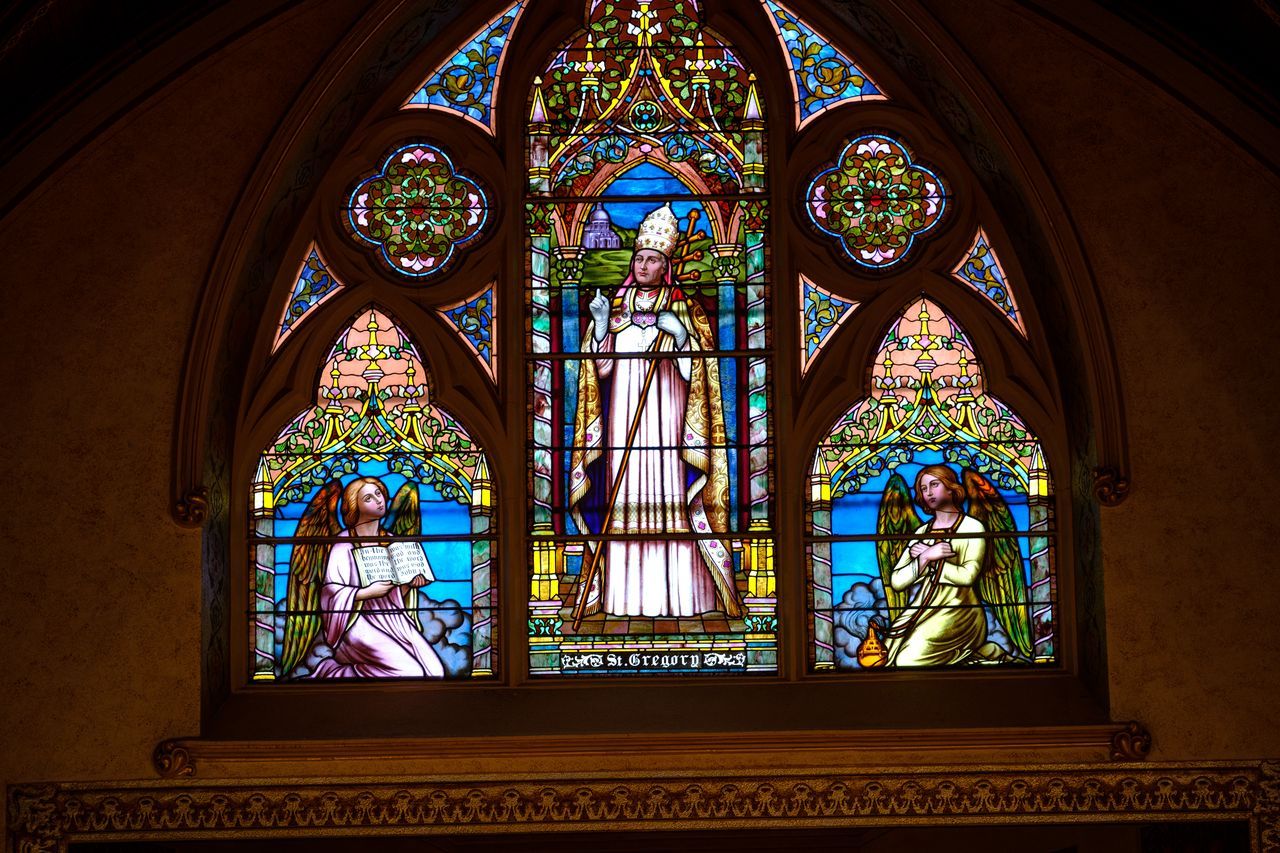The Rite of Christian Initiation is based on the principle that the process of conversion proceeds gradually, in stages. Progress from one stage to the next is marked by a liturgical celebration in the midst of the parish community. The experience and needs of those in each category described above differ, and so the length of time may vary for each person. Yet there are certain similarities among all the groups and the process they will experience. RCIA consists of four periods of formation which are marked by rituals that celebrate what has been completed and that call a person into the next phase.
What is RCIA?
The Rite of Christian Initiation for Adults, or RCIA, is a communal process for formal initiation of new members into the Catholic Church. This process is a return to the formation of the earliest members of the Church in the first and second centuries.
Parishes welcome new members into the Catholic Church through a process of education, faith sharing, and rituals known as the Rite of Christian Initiation of Adults (RCIA).
This process includes several stages marked by prayer, study, and discussion. Included in the process are several Rites, which take place within the context of the Mass. The U.S. Conference of Catholic Bishops (USCCB) describes the RCIA as a process in which participants "undergo . . . conversion as they study the Gospel, profess faith in Jesus and the Catholic Church, and receive the sacraments . . . The RCIA process follows the ancient practice of the Church and was restored by the Second Vatican Council as the normal way adults prepare for baptism."
The RCIA process can be adapted to meet the specific needs of children and youth.
Who is welcome to begin the RCIA Journey?
All people who are open to discerning their personal experience of faith and to learning more about the Catholic Church are welcome to begin the RCIA process. Many people come to an awareness of their desire to learn about membership in the Catholic Church in various and different ways. Often it may be a personal faith experience, overcoming personal difficulty and tragedy, or a relationship or discussion with a person of faith which leads one to begin this exciting journey. All that is truly required is a sincere desire to learn, to grow, and to develop one’s relationship with God. The RCIA process can be applied to the following 3 groups:
- Unbaptized persons (age of discretion: 7+ years): who have never been baptized and who need a process to help them grow in awareness to God's call to conversion as well as ways to respond to that call. They are considered catechumens.
- Baptized in another Christian church: Those who were baptized into another Christian denomination and wish to enter into full communion with the Catholic Church. They are considered candidates. For baptized Christians interested in possibly joining the Catholic Church, the process will vary depending upon the depth on one's religious and spiritual readiness.
- Baptized, but uncatechized Catholic adults: persons who were baptized as infants and not given any religious instruction in the Catholic faith. These adults will be prepared to celebrate the sacraments of penance, confirmation and Eucharist. They are also considered candidates.
It is important to note that “candidates” do not always need to take part in the full process. If they have been actively living the Christian life in another denomination, they are likely to need very little catechesis and may be welcomed into the Church on any Sunday after a short period of preparation. According to the National Statutes for the Catechumenate, "Those baptized persons who have lived as Christians and need only instruction in the Catholic tradition and a degree of probation within the Catholic community should not be asked to undergo a full program parallel to the catechumenate."
In the case of children who have reached the age of reason (age 7), the pastor of the local parish should be consulted for information about Baptism and the other Sacraments of Initiation. Adult Catholics who were baptized and received their First Eucharist in the Catholic Church and are interested in the Sacrament of Confirmation should contact their local parish office. These are Catholics who have been instructed in the Catholic faith but who have not received the Sacrament of Confirmation. A separate program of adult Confirmation is available to these Catholics, who are then prepared to receive the Sacrament of Confirmation.
The Steps of the Journey
List of Services
-
Period of Evangelization and PrecatechumenateList Item 1
The first stage is called the period of inquiry (or the precatechumenate). This is when the individual first expresses an interest in becoming a Catholic, and begins to explore, with the help of the parish community, what his or her relationship with Christ might be and how that relationship might be fulfilled and deepened by joining the Catholic Church. There is no liturgical rite to mark the beginning of this stage. There is no time limit or constraints placed on this period. It is rather a very flexible and open time period, which may take several months or several years. Some people engage in this first stage as a long process of searching and discernment. For others, it is a much shorter period of time. This stage is completed when the inquirer feels ready to move forward and the community is prepared to welcome him or her or decides against continuing in this direction. There is no commitment necessary, and no expectations during this time.
During this period of time individuals, who are called inquirers, are introduced to the person, the life, and the ministry of Jesus Christ. This period revolves around the four Gospels (Matthew, Mark, Luke and John) and learning about the Truth expressed in the Gospels. One is introduced to prayer and learns the importance of developing a prayer life. People share their personal stories and their life journeys in a supportive environment and are encouraged to ask questions about the Catholic faith. It is a time for building communion and for listening, learning, sharing, and asking questions. It is a time of initial conversation and conversion.
-
First Step: Rite of Acceptance into the Order of CatechumensList Item 2
Once the inquirer decides to continue the journey, he or she seeks acceptance into the Order of Catechumens. This is a liturgical rite in which the inquirer states publicly in the midst of the parish community that he or she wants to become a baptized member of the Church. The Church, through the local parish community, affirms this desire by accepting the person and his or her intention to follow God’s call. Included in this rite are the renunciation of false worship, giving of a new name, and the presentation of a cross. The candidate is now affirmed by the local community and strengthened to continue the journey.
For candidates who have already been baptized and are seeking full communion with the Catholic Church, this step is called the Rite of Welcoming the Candidate.
-
Period of the CatechumenateList Item 3
The second stage is called the catechumenate and is an extended period which normally lasts one year or longer. For the baptized but uncatechized (not yet educated in the faith), the period should be a similar length. “Candidates” for full communion may complete this stage in a shorter time frame. This is a time of formation and education, and learning is based on Sacred Scripture as well as the Catechism of the Catholic Church. Catechumens learn about Catholic teachings and values, what it means to be a member of the Catholic community, prayer and worship, and are also introduced to the apostolic life. This is also a time for the catechumen or candidate to learn how to live as a Catholic Christian through their faith journey and the support of their parish community. Each individual learns what it means to be a Catholic and what changes they may need to make in their lives. It is a time of deepening one’s faith, initial conversion, and commitment to the Church. This period is marked by rites such as the dismissal rite, blessings, and anointing of catechumens. This period ends when the catechumens and candidates express their desire to receive the sacraments of initiation and the parish community acknowledges their readiness. The catechumen, with the support of the parish team working with him or her, then becomes an “elect,” which is marked by the Rite of Election during the next stage.
-
Second Step: Rite of ElectionList Item 4
The Rite of Election or Enrollment of Names coincides with the beginning of Lent and is celebrated by the Bishop at the cathedral church of the diocese. The Rite includes the official enrollment of names of all those seeking baptism at the Easter Vigil. At this Rite the catechumens publicly request baptism and declare their desire to make a faith commitment to Jesus in the Catholic Church. Parishes normally celebrate the Rite of Sending prior to the Rite of Election. Godparents and catechists testify to the readiness of the catechumens for the sacraments of initiation.
-
Period of Purification and Enlightenment
The third stage is the period of purification and enlightenment. It coincides with the liturgical season of Lent. It is a time of reflection, prayer, and spiritual direction rather than a time of catechetical instruction. This period is intended to enlighten the minds and hearts of the elect with a deeper personal knowledge of Christ. During this time, the elect (formerly the catechumens) and the candidates enter into a period of intense spiritual preparation and prayer which includes the three public celebrations of the scrutinies (for catechumens) and is marked by the presentations of the Creed and the Lord's Prayer. The Rite of Election (for catechumens) and the Call to Continuing Conversion (for candidates) are celebrated at the beginning of this stage. A Lenten retreat is offered during this period as final preparations are made for the celebration of the sacraments of initiation. This period ends with the celebration of Baptism, Confirmation and Eucharist at the Easter Vigil. (Note: only the elect are baptized. All receive the sacrament of Confirmation and are welcomed at the Eucharistic table. Once a person has received the sacraments of initiation he or she becomes a “neophyte,” which means “beginner” or “novice.”)
-
Third Step: Celebration of the Sacraments of Initiation
This is a time of reflection and celebration after the formal reception into the Catholic Church. Mystagogia means “leading into the mystery” and it is a time to explore the deep mystery of our faith and go forth to help build the reign of God on Earth as new members of the faithful.
-
Period of Mystagogy Write a description for this list item and include information that will interest site visitors. For example, you may want to describe a team member's experience, what makes a product special, or a unique service that you offer.
The Pinnacle of the Journey
The celebration of the Sacrament of Initiation at the Easter Vigil marks the highlight of each person’s spiritual journey, as one celebrates with family and church community full entrance into the Catholic Church. The Liturgy begins with the Service of Light which includes the blessing of the new fire and the Paschal candle which symbolizes Jesus, the light of the World. The second part consists of the Liturgy of the Word with a number of Scripture readings. After the Liturgy of the Word, the candidates are presented to the members of the community, who pray for them and join in the Litany of the Saints. After the Litany and prayer for the elect, the presiding priest blesses the water placing the Easter or Paschal candle into the baptismal water. Those seeking baptism then renounce sin and profess their faith after which they are immersed into the baptismal water three times with the words, "I baptize you in the name of the Father, and of the Son, and of the Holy Spirit." In some situations the water may be poured over the head of each candidate.
After the baptism the newly baptized are dressed in white garments and are presented with a candle lighted from the Paschal Candle. The newly baptized are then confirmed by the priest or bishop who imposes his hands on their heads, and invokes the gift of the Holy Spirit. He then anoints them with the oil called Sacred Chrism.
The Mass continues in the usual fashion. At this point the newly baptized can participate in the general intercessions, in bringing their gifts to the altar, as well as sharing in the offering of Christ's sacrifice. At the Communion of the Mass, each of the newly baptized receives the Eucharist, Christ's body and blood, for the first time.
Symbols of the Journey
Symbols are an important part of our lives as Christians and they help to define and express the realities of our Catholic faith.
- White Robe – Each newly baptized member of the Church is presented with and dressed in a white garment to symbolize that they have become a new creation in Christ Jesus. They have now clothed themselves in Christ and pledge to always walk in the way of the Lord. The white robe also symbolizes that they have been cleansed of sin and received the gift of new life. It is the outward sign of their Christian dignity and inner devotion to God.
- Candle – Each newly baptized member of the Church is also presented with a small baptismal candle, which is lit from the Easter Candle. This candle signifies that this newly baptized Catholic has received the light of Christ and is called to always walk as a child of light. The flame of faith is now to be kept burning brightly in the life of the new Christian.
- Sacred Chrism – This oil, called Sacred Chrism, is blessed by the Cardinal at the annual Chrism Mass (In Boston, at the Cathedral of the Holy Cross during Holy Week). It is a sign of the gift of the Holy Spirit being given to the newly baptized. It is often called the “chrism of salvation” for it signifies that the person has been saved and blessed by Christ, who himself was anointed Priest, Prophet, and King. The oil is a blessing in which we pray that this newly baptized Catholic will always live as a member of Christ’s body and have a part in the gift of eternal life.
Companions for the Journey
Jesus recognized the importance of community and teamwork in spreading the Gospel, as displayed by the fact that he called a group of apostles and often sent his apostles out two by two. The Church recognizes the importance of support as one progresses through the RCIA process. First of all, candidates journey not alone but together with other adults who are learning about the Catholic Church and also with a team of dedicated people from the parish community who meets with the group regularly to offer assistance and support. Secondly, the Church also gives the inquiring person a sponsor who will share the journey and accompany you at RCIA sessions and other special events. This sponsor, who normally comes from the parish community, is called a godparent for those who have not yet been baptized and a mentor for those who have already been baptized. They are truly companions for the journey of faith and walk with each candidate through each step of the process. The sponsor also connects the candidate to the local parish community. Finally, since the RCIA process takes place within a parish community, the prayers from this community are essential for the journey. Moreover, the prayers of the universal Church are with each candidate, providing spiritual support for the journey and connection to the Church community.
Beginning the Journey
For many people interested in becoming Catholic or entering into full communion with the Catholic Church, the process can be somewhat confusing or intimidating. After all, this is a major decision in one’s life. The decision to join the Church is exciting and will lead to a deepening of personal faith and relationship to God, others, and self. No matter what has brought you here, the fact that you are interested in taking the next step shows your openness to God and God’s call in your life. Many people have come through the RCIA program and are living lives of service, faith, and love. Perhaps you are asking where to begin the journey. The answer is that you have already begun! Welcome to your faith journey! The next step may be to contact your local parish. Most parishes have an RCIA coordinator who would be happy to help you move ahead in your discernment process. Also feel free to contact the pastor and arrange a meeting to discuss your desire to become a full member of the Catholic Church. In many parishes the RCIA program begins in the fall and includes a series of weekly meetings.

The RCIA is structured over a series of ceremonial steps and periods of learning, and the timing of these may vary for each individual. One may take as much time as he or she needs in the initiation process before becoming ready for full initiation through the Sacraments of Baptism, Confirmation, and the Eucharist. Initiation within the Church is a journey of conversion that is gradual and ongoing and suited to individual needs. It is a process rather than an educational program and this process takes place within the community of the faithful, the local Church.








